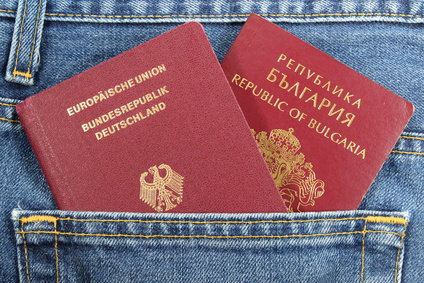Special Considerations for Dual or Multiple Citizenship
 Having two or more nationalities (multiple citizenship) is a circumstance as old as citizenship itself. This section will cover exclusively the situation of persons, who are citizens of both Germany and one other country. When you have two citizenships and neither of them are German, then legal juggling can start. Which citizenship will prevail? Supposing this is really an issue, the general rule will be the country with the closest relationship.
Having two or more nationalities (multiple citizenship) is a circumstance as old as citizenship itself. This section will cover exclusively the situation of persons, who are citizens of both Germany and one other country. When you have two citizenships and neither of them are German, then legal juggling can start. Which citizenship will prevail? Supposing this is really an issue, the general rule will be the country with the closest relationship.
N.B.: As far as terminology goes, whenever “home country” is mentioned, Germany will be meant, and whenever “other home country” is referred to, this relates to the country of your second nationality.
When can the case arise that a person holds multiple citizenship?
It can be that person has more than one citizenship in one of the following cases:
- by birth to multinational parents, with at least one parent a citizen of a country other than Germany, or
- by birth to parents having a nationality which grants its citizenship by “inheritance” and the country of birth grants its citizenship by birth on its soil,
- by adoption of a child by Germans, or
- by marriage to a person whose country automatically grants its citizenship to a citizen’s spouse.
§
What's it like being a dual citizen in daily life?
In everyday life, it does not matter how many and which citizenships you have. Your citizenship is of no importance whatsoever when purchasing products of daily use. You can shop for groceries whether you are German or Seychellois, or both. Here it is of no question that German law is applicable. In questions involving multiple citizenships, it can be hard to determine whose laws settle the issue of the applicable law. This problem applies to questions like marriage, names, divorce, and inheritance. German citizenship will always influence the answer of which law(s) is (are) applicable. However, you can never seek asylum from the country of one of your citizenships in the country of your other nationality. Being a national of this country you fled to, you are entitled to enter and sojourn as you wish.
§
Next to my other citizenship I also have German citizenship. Is that anything special?
When in Germany and you also have German citizenship, then usually this fact will prevail (Art. 5 I 2 EGBGB). Exceptions might be applicable when the law of the other citizenship seems better applicable then German.
§
What is my general relationship with my two home countries?
Even if you have multiple citizenships, the law will generally treat you as if you had only one nationality (for Germany art. 5 I 2 EGBGB). Being bound to two different countries, multiple citizens have rights and duties of both countries. In some cases this can lead to problems no matter where you live, especially if you run into controversial responsibilities in areas like abortion, which may be allowed in one country but not in the other. Alternatively, you may encounter conflicting benefits, such as the right to vote in the elections of the country where you do not normally reside. Certain rights and duties are simply subject to nationality and have nothing to do with where you live. One of your home countries may try to draft you, for instance, just because you are one of its nationals, even if you are out of that country. Consult the embassy or an attorney, qualified in the other domestic law, if you have any questions. If you fail to keep things straight, you could find yourself landing in jail whenever you enter your second country.
§§§
What are the major problems when one has multiple citizenship?
Special problems often arise in regard to personal relationships, e.g. in marriages, divorces and inheritances. Every country, after all, has the right to apply its own law to its individuals not regarding its multiple nationality. This creates problems when the laws of various countries contradict each other, or if each nation uses incompatible legal concepts. A multinational married to two or move wives, for instance, may find that his second country recognizes his first marriage but none other.
§§§
As a multinational, can I vote in the elections of both my countries?
Generally speaking, multinationals have the right to vote in the country whose citizenship they have. Details are subject to national regulation. If you also have German citizenship then you have all rights to vote – disregarding the fact that you have another nationality. Another point: in the EU, multinationals of two member states can only vote once. Feeling like running for office? If you want to be a candidate in such an European election, you can run only in one country. The member states have set up an information system preventing multinationals from voting in two home states. It is also illegal to run as a candidate in more than one country. To find out the modalities for foreigners to vote who are living abroad, contact your local embassy.
§
